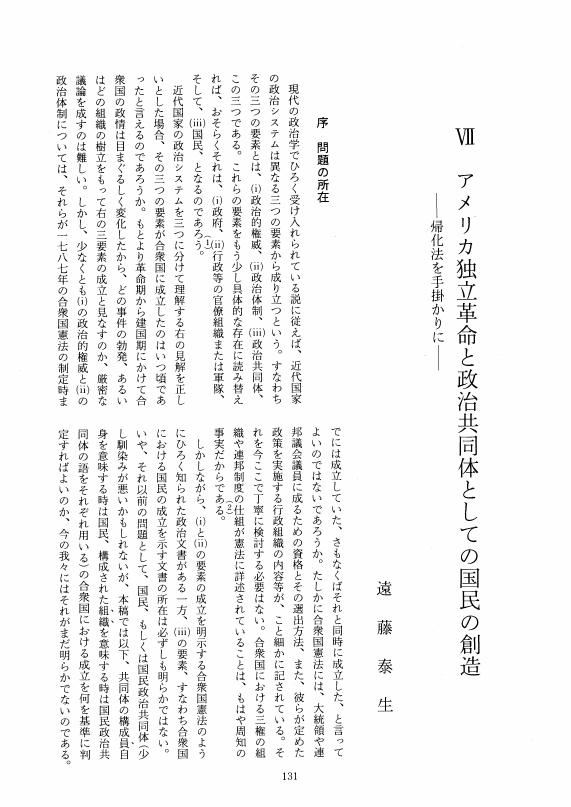1 0 0 0 OA T. ホッブズ『リヴァイアサン』におけるプライドと徳
- 著者
- 中神 由美子
- 出版者
- 日本政治学会
- 雑誌
- 年報政治学 (ISSN:05494192)
- 巻号頁・発行日
- vol.60, no.2, pp.2_178-2_202, 2009 (Released:2013-02-07)
In the history of political thought, human pride, a feeling of excellence, linked with desire of honour and reputation, has been a cornerstone for political liberty. However, since sixteenth century many thinkers have attacked pride as vanity. The contemporary studies such as Strauss’ have claimed that Hobbes’ Leviathan used the term in this bad sense. Certainly, Hobbes emphasized equality of human kind and recognized its dangerous side as ‘vain glory’ leading to the civil war. Nevertheless, in his volume, pride can be equated with generosity or self-confidence as a virtue. The passion in a true and good sense is rather the inner feeling of one's own powers based on one's actual merits. For Hobbes, it works as motivation to help to the others, or appears as courage against ‘fear’ in his covenant theory.
- 著者
- 宮地 忠彦
- 出版者
- 日本政治学会
- 雑誌
- 年報政治学 (ISSN:05494192)
- 巻号頁・発行日
- vol.58, no.2, pp.2_163-2_183, 2007
This paper analyzes the Japanese police's "Zendo-shugi" policy to the Korean residents in the late Taisho period. It aimed to ease the discontent of the Korean residents except "Hutei(dangerous)" Koreans. It was influenced mainly by the new policy of the Government-General of Korea after the March First movement and also partly by the new policy of the Japanese police after the Rice Riot and the former colonial bureaucrats and their policy. In rivalry with the judiciaries, the police tried to understand the anti-Japanese sentiment of the Koreans and satisfy them. But it tended to provoke the Koreans' antipathy toward its interference and had a problem that "Zendo" raised the Korean nationalism. And it was difficult for the police to realize the policy because lower-ranking policemen couldn't understand the "Zendo-shugi". And further, as some Korean immigrant workers the police hadn't seen dangerous sometimes resorted to violence, the police had trouble in distinguishing dangerous Koreans from good Koreans
1 0 0 0 OA ベルギーのエスニック紛争と連邦制-一九九三年の連邦制への移行に関する一考察-
- 著者
- 津田 由美子
- 出版者
- 日本政治学会
- 雑誌
- 年報政治学 (ISSN:05494192)
- 巻号頁・発行日
- vol.45, pp.41-60, 1994-12-22 (Released:2009-12-21)
1 0 0 0 OA アメリカ独立革命と政治共同体としての国民の創造
- 著者
- 遠藤 泰生
- 出版者
- 日本政治学会
- 雑誌
- 年報政治学 (ISSN:05494192)
- 巻号頁・発行日
- vol.41, pp.131-149, 1991-08-30 (Released:2009-12-21)
- 著者
- 遠藤 泰生
- 出版者
- 岩波書店
- 雑誌
- 日本政治学会年報政治学 (ISSN:05494192)
- 巻号頁・発行日
- no.1990, pp.p131-149, 1990
1 0 0 0 OA アラブの政治文化と国民形成 -アイデンティティー・クライシスをめぐる試論-
- 著者
- 板垣 雄三
- 出版者
- 日本政治学会
- 雑誌
- 年報政治学 (ISSN:05494192)
- 巻号頁・発行日
- vol.29, pp.70-78, 1980-03-26 (Released:2009-12-21)
1 0 0 0 序 政治発展論の再生を求めて (第三世界の政治発展)
- 著者
- 矢野 暢
- 出版者
- 岩波書店
- 雑誌
- 日本政治学会年報政治学 (ISSN:05494192)
- 巻号頁・発行日
- no.1986, pp.巻頭p5-15, 1986
1 0 0 0 OA 「近代軍」形成期のオスマン帝国における軍人と政治-一八二六-一九〇八年-
- 著者
- 鈴木 董
- 出版者
- 日本政治学会
- 雑誌
- 年報政治学 (ISSN:05494192)
- 巻号頁・発行日
- vol.40, pp.187-209, 1990-03-29 (Released:2009-12-21)
- 著者
- 待鳥 聡史
- 出版者
- 木鐸社
- 雑誌
- 年報政治学 (ISSN:05494192)
- 巻号頁・発行日
- vol.2009, no.1, pp.140-161, 2009



